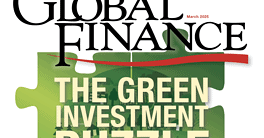DEAR READER
July/August 2010 | VOL.24 NO.7
Almost three years after the global financial crisis began, the repercussions rumble on. The latest convulsions that wracked the world’s markets may have subsided with the rolling out of Europe’s giant stabilization package, and the euro’s dramatic slide may have eased, but the underlying problems remain. In fact, as we find out in our cover story this month, those underlying problems may be getting deeper and more intractable than ever.
The problem, as it has been for so much of these past three years, is debt. Since the beginning of the crisis, when legions of overextended homeowners in the United States began defaulting on their mortgages, the debt burdenor, more specifically, the over-leveraginghas been working its way up the financial food chain. From consumers to mortgage banks, and from there to the financial system as a whole, the ripple of individual defaults swelled into the tsunami of the credit crunch.
After the swift and decisive action by governments around the world, it seemed for a while that the crisis might be coming to an end. Certainly, the stabilization efforts by governments and multilateral lenders helped to quell the panic that tore through global markets at the height of the financial crisis. But at what cost? A huge amount of private sector debt has simply been shifted to the public sector, leaving many governments looking dangerously exposed.
With its tremendous debt burden and its profligate habitsboth public and privatethe US is arguably as vulnerable as any country. While it is protected to an extent by the sheer size of its economy and the preeminence of the dollar, the stability of the US is also unusually heavily dependent on sentiment toward its currency. It wouldn’t take muchsay, China’s aggressively promoting the renminbi as an alternative global reserve currencyto destabilize it. Given the hair-trigger risk-aversion among global investors and the speed at which speculators can pile onto an attack against a wobbling currency, the results could be devastating.
Unless the over-leveraged economies of the developed world address their debt problem, there is every chance that they will find themselves in what one analyst calls an “infinite loop” of bailouts. With that daunting scenario becoming a very real possibility, there is no doubt that for the West, it’s payback time.
Until next month.
Dan Keeler
dan@gfmag.com

